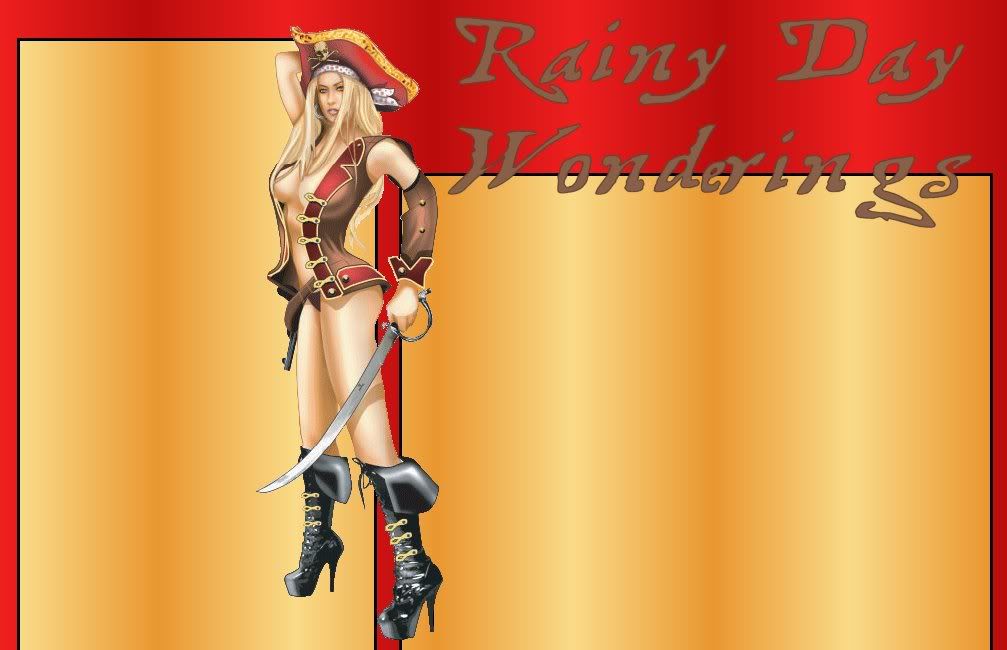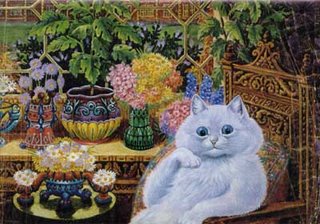
What is bipolar disorder?
Bipolar disorder, or manic depression, is a medical illness that causes extreme shifts in mood, energy, and functioning. These changes may be subtle or dramatic and typically vary greatly over the course of a person’s life as well as among individuals. Over 10 million people in America have bipolar disorder, and the illness affects men and women equally. Bipolar disorder is a chronic and generally life-long condition with recurring episodes of mania and depression that can last from days to months that often begin in adolescence or early adulthood, and occasionally even in children. Most people generally require some sort of lifelong treatment. While medication is one key element in successful treatment of bipolar disorder, psychotherapy, support, and education about the illness are also essential components of the treatment process.
What are the symptoms of mania?
Mania is the word that describes the activated phase of bipolar disorder. The symptoms of mania may include:
- either an elated, happy mood or an irritable, angry, unpleasant mood This can happen to anyone, with or without mental illness.
- increased physical and mental activity and energy. My career choice requires a great deal of concentration and focus which is why I can keep my job unlike others (bipolar) who have difficulty keeping their jobs.
- racing thoughts and flight of ideas. This happens everyday however, it is worse in times of crisis or a 'mixed' state. See below.
- increased talking, more rapid speech than normal. Truthfully I am usually quite shy and I am terrified of talking out of my ass and sticking my foot in my mouth. Besides, I learn more by observation.
- ambitious, often grandiose plans. Ambitious? That is me in a nutshell. I suffered many grandiose plans before my diagnosis, and after therapy have learned many techniques to control them.
- risk taking I have always been a risk taker, even as a child. I enjoy playing the stock market.
- impulsive activity such as spending sprees, sexual indiscretion, and alcohol abuse. Spending sprees? This is why I keep my credit cards locked up in a saftey deposit box. Sexual indiscretions? Yes. I am not ashamed nor do I feel guilty bout any of them. As far as alcohol or drug abuse I have no experience with either of them.
- decreased sleep without experiencing fatigue. My body only requires four to five hours of sleep and no I do not have dark circles under my eyes.=)
What are the symptoms of depression?
Depression is the other phase of bipolar disorder. The symptoms of depression may include: Just a reminder I am Bipolar II, my symptoms for depression are less severe and don't last as long as my periods of mania do.
- loss of energy
- prolonged sadness
- decreased activity and energy
- restlessness and irritability
- inability to concentrate or make decisions
- increased feelings of worry and anxiety
- less interest or participation in, and less enjoyment of activities normally enjoyed
- feelings of guilt and hopelessness
- thoughts of suicide
- change in appetite (either eating more or eating less)
- change in sleep patterns (either sleeping more or sleeping less)
What is a "mixed" state?
A mixed state is when symptoms of mania and depression occur at the same time. During a mixed state depressed mood accompanies manic activation.
What is rapid cycling?
Sometimes individuals may experience an increased frequency of episodes. When four or more episodes of illness occur within a 12-month period, the individual is said to have bipolar disorder with rapid cycling. Rapid cycling is more common in women.
What are the causes of bipolar disorder?
While the exact cause of bipolar disorder is not known, most scientists believe that bipolar disorder is likely caused by multiple factors that interact with each other to produce a chemical imbalance affecting certain parts of the brain. Bipolar disorder often runs in families, and studies suggest a genetic component to the illness. A stressful environment or negative life events may interact with an underlying genetic or biological vulnerability to produce the disorder. There are other possible "triggers" of bipolar episodes: the treatment of depression with an antidepressant medication may trigger a switch into mania, sleep deprivation may trigger mania, or hypothyroidism may produce depression or mood instability. It is important to note that bipolar episodes can and often do occur without any obvious trigger.
How is bipolar disorder treated?
While there is no cure for bipolar disorder, it is a treatable and manageable illness. After an accurate diagnosis, most people can achieve an optimal level of wellness. Medication is an essential element of successful treatment for people with bipolar disorder. In addition, psychosocial therapies including cognitive-behavioral therapy, interpersonal therapy, family therapy, and psychoeducation are important to help people understand the illness and to internalize skills to cope with the stresses that can trigger episodes. Changes in medications or doses may be necessary, as well as changes in treatment plans during different stages of the illness.
Source: NAMI
Want to know more? Go here, here or here.
Labels: depression, Mental Illness Awareness Week
N Posted by Rain at 10/05/2006 10:02:00 AM



Wednesday, October 04, 2006
Mental Illness Awareness Week

Look Around You:
It’s Mental Illness Awareness Week
Stop. Look around. When you’re at your job, driving in your car, in your classroom, grocery store, library or church. One in five people you see is affected by mental illness.
What is mental illness?
Scientists tell us that mental illness is a medical illness, and being sick with mental illness is no different than being sick with diabetes or heart disease. But if you, or someone you love, has a mental illness it can mean a lifetime of health maintenance and specialized care.
Mental illnesses can often profoundly disrupt a person’s thinking, feeling, mood, and ability to relate to others. Mental illnesses include such disorders as bipolar disorder, schizophrenia, depression, obsessive-compulsive disorder, anxiety disorders, including post-traumatic stress disorder (PTSD), borderline personality disorder, and other severe and persistent mental illnesses.
Mental illnesses can affect persons of any age, race, religion, or socioeconomic status.
Mental illnesses are not the result of personal weakness, lack of character, or poor upbringing. They are not the fault of parents or the person with the illness.
Without treatment the potential consequences of mental illness for the individual and society are staggering: unnecessary disability, unemployment, substance abuse, homelessness, inappropriate incarceration, and suicide. The economic cost of untreated mental illness is more than 100 billion dollars each year in the United States.
If mental illness affects you or your family, you are not alone. In your neighborhood you can find support and education. The National Alliance on Mental Illness (NAMI) is the nation's largest grassroots mental health organization dedicated to improving the lives of persons living with serious mental illness and their families.
Since its founding in 1979, NAMI has become the nation’s voice on mental illness. With organizations on the national level, in every state, and in over 1100 local communities across the country, NAMI joins together to achieve its mission through research, education,, support and advocacy.
This week NAMI observes Mental Illness Awareness Week. Established in 1990 by Congress, the first week of October is designated to promote greater public understanding of the nature of mental illness, and to encourage people to get help when they need it., Treatment options exists, and treatment works, if a person gets it.
Look around. If you see that fifth person in need of help, honor their individual dignity and give encouragement. Help them find it.
When you see the next fifth person, remember that it could be you.
For more information about mental illness or to find your local NAMI chapter, call 800-950-NAMI (6264) or visit, visit www.nami.org.
Source: NAMI
Have a good night everyone! Comments are always appreciated!Labels: Mental Illness Awareness Week, NAMI
N Posted by Rain at 10/04/2006 08:58:00 PM



Tuesday, October 03, 2006
My Mothers Favorite
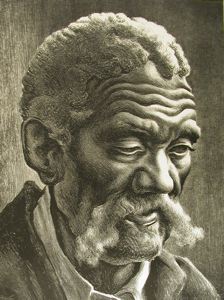
Thomas Hart Benton
Aaron1941
Medium and Support: lithograph on paper
Thomas Hart Benton, an American Regionalist artist, was born in Neosho, Missouri in 1889. At an early age, Benton looked beyond his storied political familial roots to a career as an artist. He studied at the Chicago Art Institute and the Academie Julien in Paris where he developed his new style. He then settled in New York and painted in the Synchromist style of his schoolmate, Stanton Macdonald-Wright.
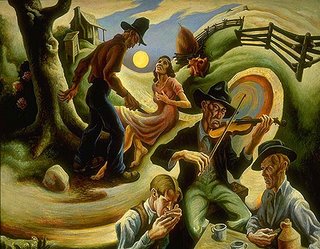
Thomas Hart BentonThe Ballad of the Jealous Lover of Lone Green Valley
Oil and tempra on canvas
In 1920, Benton switched to the Regionalist style, depicting scenes of American life. Benton's great love, however, was the common man and his plight. His paintings delight in glorifying this backbone of the American consciousness. Known as a great mural painter, Benton created images for the Missouri Capitol Building, the New School for Social Research in New York City, the Power Authority of the State of New York, and the Indiana Capitol Building.

Thomas Hart Benton
The Lord is my Shepherd, 1926
Tempera on Canvas
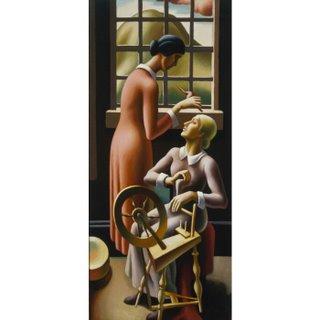
Thomas Hart Benton
Industry (Women Spinning)
1924-27
Oil on canvas
He became the director of the City Art Institute and School of Design in Kansas City, Missouri in 1935 and remained there for the rest of his life. After the decline of Regionalism, Benton began painting scenes of American history. He also wrote two autobiographies titled “An Artist in America” and “An American in Art.” He painted throughout his entire life of 76 years. In fact, at the time he passed away, he had his brushes in his hands and was seated in front of his final mural that he had just completed. The world's largest public collection of his works is located at Missouri's own Nelson-Atkins Museum of Art.
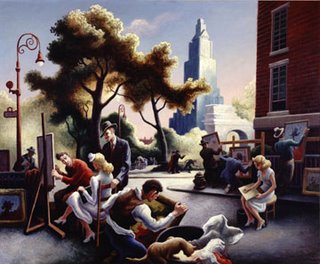
Thomas Hart Benton
The Artists' Show, Washington Square, New York 1946
Oil and tempera on canvasMy mother was a huge fan of Bentons and during her periods of Bipolar Mania she would drag me all over the country to visit museums and gallery openings. I recall these times as the best in my childhood, and this is how my appreciation for the arts formed. My father on the other hand thought much differently, because of the huge amounts of money that my mother would spend and the fact that he was never really sure where we were or what she was "doing" in my presence. Needless to say my mother was prone to very risky behavior however, thats a whole different post.
I have had the opportunity to visit the Nelson-Atkins Museum and I have visited the murals at both the Missouri and Indiana Capitol Bulidings. If you ever have a chance to see Bentons work I urge you to do so. His paintings are wonderful!
Have a great day and as always comments are appreciated.
Labels: Art, Benton, Regionalism
N Posted by Rain at 10/03/2006 07:39:00 AM



Monday, October 02, 2006
Hunky Monday
Something for everyone...

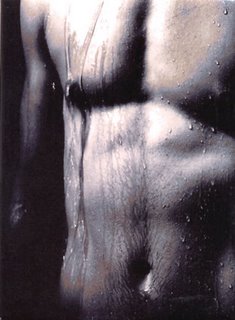
I accomplished absolutely nothing this weekend, and it was wonderful!
How was your weekend?Labels: Hunky Mondays
N Posted by Rain at 10/02/2006 08:35:00 AM



